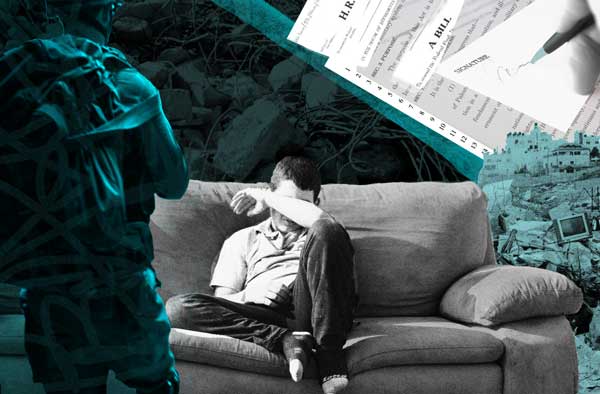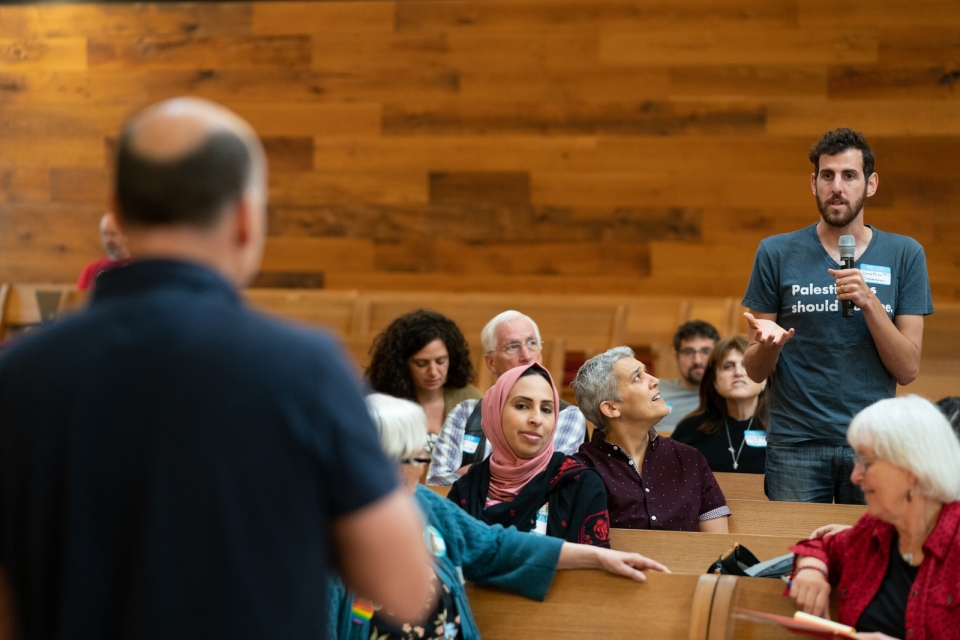
This story was originally published in the March 2020 issue of Quaker Action. It was updated in April 2021.
Early on the morning of Sept. 20, 2017, around 2 a.m., Israeli soldiers entered the home of Laith, a 17-year-old from Kafr Ein village in the West Bank. Laith was bound, blindfolded, and physically assaulted – and was never presented with a warrant or told why he was being arrested.
Over the next 11 hours, Laith was transferred to multiple locations and interrogated about throwing stones, which is considered a “security offense” under Israeli military law. He denied the allegations against him.
Laith would spend 46 weeks – nearly a year – in detention. He would have multiple court appearances, but never be charged with any crime. And on Aug. 16, 2018, he would be released without explanation, having missed his final year of high school.
Laith is just one of the 10,000 Palestinian children in the West Bank who, since 2000, have been arrested and held in the Israeli military detention system that denies them their basic rights. For the past four years, AFSC and Defense for Children International-Palestine have partnered on the No Way to Treat a Child campaign to expose this widespread and systemic abuse of Palestinian children. It is one part of AFSC’s ongoing work to end Israel’s occupation of the Palestinian territory.
“All children have the right to a safe and just future,” says Jennifer Bing, AFSC coordinator for the campaign. “But every year, Israel prosecutes between 500 and 700 Palestinian children in military courts. We must put a stop to this inhumane treatment – and the U.S. has a critical role to play in making that happen.”
No Way to Treat a Child

Israel is the only country in the world that automatically prosecutes children in military courts. There, Palestinian children lack fundamental fair trial rights and protections. Children typically arrive to interrogations bound, blindfolded, and sleep-deprived. They often give confessions after verbal abuse, threats, and physical and psychological violence. Many children have been held in solitary confinement solely for interrogation purposes. They have no right to legal counsel during interrogation, and Israeli military court judges rarely exclude confessions obtained by coercion or torture.
Our No Way to Treat a Child campaign calls on the United States government to use all available means to pressure Israeli authorities to end the detention and abuse of Palestinian children. First and foremost, that means prohibiting U.S. taxpayer money from funding the military detention of children by any country, including Israel.
Toward this end, AFSC has worked with faith communities, partner organizations, and individuals across the U.S. to engage members of Congress through briefings on Capitol Hill; legislative visits; and emails, petitions, and phone calls from constituents. We offer trainings and webinars, organize speaking tours, and advise faith-based communities and others on ways to make their voices heard.
And our efforts are making a difference. In April 2021, Rep. Betty McCollum introduced new legislation to hold Israel accountable for its continued abuse of Palestinian children in military detention. The new bill “Defending the Human Rights of Palestinian Children and Families Living Under Israeli Military Detention Act” (H.R. 2590) would prohibit U.S. funding for detaining and abusing Palestinian children, demolishing and seizing Palestinian homes, and further annexing Palestinian lands in the occupied West Bank. H.R. 2590 builds from similar bills introduced by McCollum in 2017 and 2019 that centered Palestinian rights.
“Peace can only be achieved by respecting human rights, especially the rights of children, and this includes the U.S. taking responsibility for how taxpayer-funded aid is used by recipient countries, Israel included. Congress must stop ignoring the unjust and blatantly cruel mistreatment of Palestinian children and families living under Israeli military occupation,” McCollum said in a statement.
H.R. 2590 was introduced with 13 co-sponsors in Congress and endorsed by over 100 organizations. “I strongly believe there is a growing consensus among the American people that the Palestinian people deserve justice, equality, human rights, and the right to self-determination,” said McCollum. “The unprecedented endorsement of this bill by human rights organizations as well as Christian, Jewish, and Muslim organizations is indicative of an energized movement in support of human rights for Palestinians. It is time for Americans, especially Members of Congress, to stand with Palestinians and Israelis who seek a future of peace and justice.”
Today there are more members of Congress who are not afraid to challenge the status quo when it comes to addressing human rights violations that are happening in other countries, including Israel. Jennifer says, “I’m particularly pleased that all supporters of the bills centering Palestinian children’s rights were re-elected by wide margins in the 2020 election. Several newly elected representatives were also among the first to support H.R. 2590 and Dear Colleague letters to Secretary of State Blinken on Palestinian access to the COVID-19 vaccine, restoring aid to Palestinians, and stopping Israeli demolitions of Palestinian homes this year.”
Congregations step up

Since the launch of the No Way to Treat a Child campaign, several U.S.-based church bodies have passed national resolutions to protect the rights of Palestinian children, including the Episcopal Church, the United Church of Christ, the Presbyterian Church, and, most recently, the Evangelical Lutheran Church.
“Jesus said that it would be better to have a millstone hung around the neck and be cast into the sea rather than to cause even one of these little ones to stumble,” says the Rev. Jim Moos, UCC associate general minister for global engagement and operations. “We have a moral obligation to leverage our support of the state of Israel to ensure that the mistreatment of Palestinian children ceases and that justice be accorded to all.”
Other congregations have developed curricula to study the issue, hosted speaking events in their communities, lobbied their members of Congress, and organized visits with families impacted by detention during their own trips to the occupied Palestinian territory.
Would you like to help us build support for Palestinian rights?
Visit us at afsc.org/nowayresource to:
1) Email your member of Congress: Urge them to support legislation to end the detention of Palestinian children.
2) Check out our messaging tips: We offer best practices to talk to your children, representatives, and others.
3) Sign up for monthly webinars led by the No Way to Treat a Child campaign. You can also access videos and advocacy resources online.
In addition, AFSC is looking for 100 Quaker meetings and other congregations to engage with our No Way to Treat a Child campaign. Will yours be one of them? Contact Lucy Duncan, director of Friends Relations, to learn more.